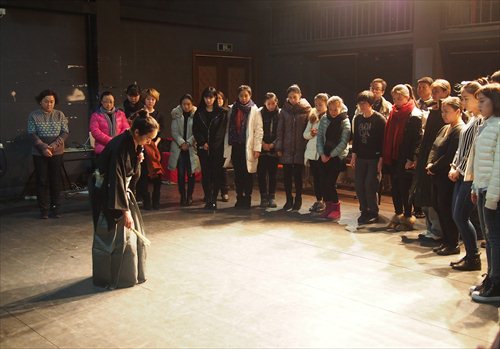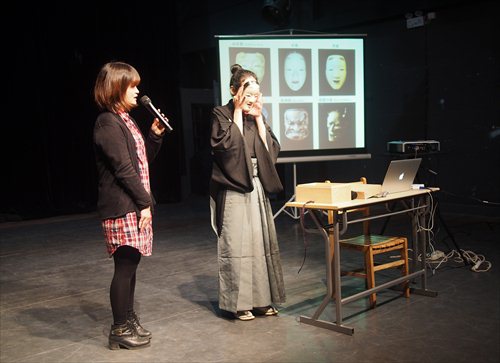HOME >> METRO SHANGHAI
Heiress of classical Japanese opera teaches workshops in Shanghai
By Liao Fangzhou Source:Global Times Published: 2015-12-27 18:08:01
Masks whose expressions change with a tilting of the wearer's head, black silk robes, and slow, stylistic movements. Noh, a form of Japanese classical music drama that has existed virtually unchanged since the 14th century, has arrived in Shanghai.
Soraya Umewaka, a 16th generation member of the Umewakas, one of Japan's most distinguished Noh-performing families since the Edo era (1603-1867), gave presentations and workshops recently at the Shanghai Theatre Academy.
The Japanese-Lebanese actress explained the basics of Japanese opera, including its history, major categories and themes, and performance elements including masks, stages and props.
Umewaka also played short video clips of her father Naohiko Umewaka, a renowned Noh performer and scholar. Footage of Umewaka's Noh debut, at the age of 3, made the audience gasp.
She admitted to the Global Times that her Noh training was compulsory and she did not understand it at such a young age. But over time Umewaka said she has come to appreciate its appeal and hopes to promote it around the world. In an interview with The Tokyo Files, Umewaka said she believed Noh remains a valuable art form as it contains elements that do not exist in most popular entertainment mediums today.
Umewaka feels the hardest part of Noh is its extreme constraints. "A performer has to refrain from any redundant movements - my father would scold me if I accidentally moved my head or body even just a little. For example, when I walk during a performance, I have to keep my head and upper body completely motionless," she said.
Timeless tradition
Classical Noh cannot be altered, as the gestures and movements are highly abstract, and the language is in ancient Japanese. Ma Yirong, a sophomore of Chinese Opera Directing at the Shanghai Theatre Academy, told the Global Times that she was amazed by how Noh performers strictly obey its timeless traditions. Yet she also worries that because of this it might be difficult for Noh to continually attract an audience.
"Chinese opera encompasses movements that are much more dramatic and expressive, so it is more straightforward for the audience to grasp what is going on in the characters' inner worlds. Noh, however, is so subtle; its form and language guarantees that it cannot have a very big audience," Ma said.
One of the clips Umewaka played was Lear Dreaming, a Noh adaptation of King Lear. This draws parallel to Lear is Here, in which Taiwanese artist Wu Hsing-kuo revisits the story via Peking Opera in the hopes of drawing new, younger audiences.
Umewaka, a graduate of Comparative Politics from Princeton University, is also a filmmaker and production specialist. She has been working on a documentary about Noh with her younger brother, who filmed her Shanghai presentations and workshops. The documentary will be released next year.
"My lifetime goal is to promote Noh in a more interesting way, by film or other media, so that audiences can increase their understanding of the art and not jump to the conclusion that it is boring," Umewaka said.
During the workshops, dozens of young students were introduced to basic Noh poses by Umewaka. Ma, who practiced Yue Opera for six years, said Noh is less technical in comparison. She believes the art form's key lies in its "inner control," which can be difficult to maintain throughout an entire performance.
"That is why I think only real enthusiasts can learn Noh and build a career around it, and why I find Umewaka admirable," Ma said.


Newspaper headline: Noh way
Soraya Umewaka, a 16th generation member of the Umewakas, one of Japan's most distinguished Noh-performing families since the Edo era (1603-1867), gave presentations and workshops recently at the Shanghai Theatre Academy.
The Japanese-Lebanese actress explained the basics of Japanese opera, including its history, major categories and themes, and performance elements including masks, stages and props.
Umewaka also played short video clips of her father Naohiko Umewaka, a renowned Noh performer and scholar. Footage of Umewaka's Noh debut, at the age of 3, made the audience gasp.
She admitted to the Global Times that her Noh training was compulsory and she did not understand it at such a young age. But over time Umewaka said she has come to appreciate its appeal and hopes to promote it around the world. In an interview with The Tokyo Files, Umewaka said she believed Noh remains a valuable art form as it contains elements that do not exist in most popular entertainment mediums today.
Umewaka feels the hardest part of Noh is its extreme constraints. "A performer has to refrain from any redundant movements - my father would scold me if I accidentally moved my head or body even just a little. For example, when I walk during a performance, I have to keep my head and upper body completely motionless," she said.
Timeless tradition
Classical Noh cannot be altered, as the gestures and movements are highly abstract, and the language is in ancient Japanese. Ma Yirong, a sophomore of Chinese Opera Directing at the Shanghai Theatre Academy, told the Global Times that she was amazed by how Noh performers strictly obey its timeless traditions. Yet she also worries that because of this it might be difficult for Noh to continually attract an audience.
"Chinese opera encompasses movements that are much more dramatic and expressive, so it is more straightforward for the audience to grasp what is going on in the characters' inner worlds. Noh, however, is so subtle; its form and language guarantees that it cannot have a very big audience," Ma said.
One of the clips Umewaka played was Lear Dreaming, a Noh adaptation of King Lear. This draws parallel to Lear is Here, in which Taiwanese artist Wu Hsing-kuo revisits the story via Peking Opera in the hopes of drawing new, younger audiences.
Umewaka, a graduate of Comparative Politics from Princeton University, is also a filmmaker and production specialist. She has been working on a documentary about Noh with her younger brother, who filmed her Shanghai presentations and workshops. The documentary will be released next year.
"My lifetime goal is to promote Noh in a more interesting way, by film or other media, so that audiences can increase their understanding of the art and not jump to the conclusion that it is boring," Umewaka said.
During the workshops, dozens of young students were introduced to basic Noh poses by Umewaka. Ma, who practiced Yue Opera for six years, said Noh is less technical in comparison. She believes the art form's key lies in its "inner control," which can be difficult to maintain throughout an entire performance.
"That is why I think only real enthusiasts can learn Noh and build a career around it, and why I find Umewaka admirable," Ma said.


Soraya Umewaka gives a presentation of Noh recently at the Shanghai Theatre Academy. Photos: Liao Fangzhou/GT
Newspaper headline: Noh way
Posted in: Metro Shanghai